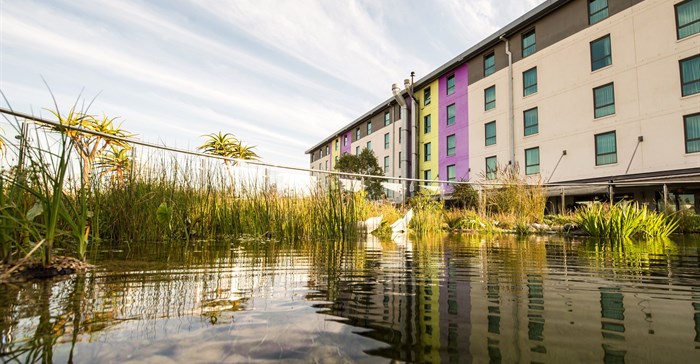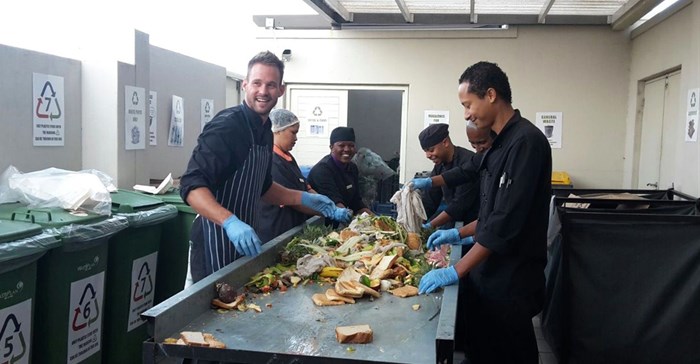Hotel investors and developers are inspecting the financial spreadsheets in search of a return on investment (ROI) for responsible development. In this day and age, building 'green' should be the norm rather than the exception, however, misconceptions on green building 'tax' still seem to hinder the decision.
The key elements of a green hotel are not limited to whether the hotel is built sustainably and effectively, but more importantly that the operation of the hotel is focussed on how environmentally friendly and carbon-neutrally the hotel operates.
According to Mario Delicio, co-owner of the hotel and founder of the Verde Group, three main factors should be considered when calculating ROI.
Construction, planning and building
By using the lowest number of resources and clever design, the hotel was able to set the bar for green building in the hotel industry.
Delicio boils it down to 'out of the box' thinking and pushing boundaries as the hotel introduced breakthrough sustainable concepts to its build. A 10% green building cost premium allowed for the inclusion of solar panels, double glazing, a grey water system, and an al all-encompassing HVAC system that controls the heating and cooling of the hotel. “Building green these days has become much cheaper since we built Hotel Verde Cape Town."
"We paid a premium for our sustainable design and product development." Since then, the government has included sustainable elements as compulsory in the building industry. Many environmentally-conscious products have now become standard and, by manner of course, cheaper - "Solar panels, for example, are 25% cheaper today than when we installed them at Hotel Verde Cape Town." Although building green today still carries a financial premium, Delicio calculates that it should not be more than 4 to 5%.
Operating sustainably
Operational savings come into play when calculating the financial return on investment for the premium of building green, as bean counters off-set the higher building cost with lower operational costs of running a green hotel.
Operational savings include income through waste, income through water savings and income through energy-saving efforts. Hotel Verde projected a seven-year period before it began seeing ROI on the additional costs incurred by building green. Ironically, Delicio says that the electricity crises in 2014 and the resulting load shedding, along with the Cape Town drought and water crisis, have brought Hotel Verde’s break-even early to a five-year period. It is clear that the additional cost of power through generators, increased the cost of electricity, along with the increase in the cost of water through the water crises have resulted in financial savings for the hotel, while other Cape Town hotels were bleeding.
Responsibility to the staff and community
Procurement is a big aspect of responsible operations and Hotel Verde goes to great lengths to source locally and even produce their own vegetables, herbs, honey and bottle their own water. Waste management is a top priority, as the hotel has recently achieved its target of 98% saving on waste-to-landfill; an impressive achievement for a notoriously high waste-generating operation.
Delicio says employees come first and believes that: "Only if the employee is looked after, will he look after his guest.
Employees are your biggest ambassadors and when operating a green icon such as Hotel Verde, for example, it is your responsibility to make sure that your employees are educated and enlightened to be environmentally conscious representatives." Staff turn-around is low at Hotel Verde and the high retention rate is a reflection of staff satisfaction. Acting and working in a green environment has been proved to increase staff welfare and happiness.
Does green matter to the guest?
The big question often asked is: "Do guests base their accommodation choices on the green aspect?" According to Calvin Boia, marketing executive at Verde Hotels, in comparing guest return for an airport hotel, the hotel fairs well with an up to 35% return guest rate. More and more people are supporting the green idea and guests honour that in return. "Sustainable travel is at an all-time high, as opting for a green hotel becomes an important part of the choice. We certainly don’t believe that guests should be paying more for staying in a green hotel, so we don’t support that concept, but we are aware that our successful occupancy rate can be attributed largely to our green-ness."
Green pundits will agree, the 'educational' value of staying at a green hotel, especially one that aims to educate the guest. Reviews of the hotel are a telling tale, as guest comments frequently remark on the take-home value of what they have learned through staying at Hotel Verde.
Delicio says that guests are drawn into the green experience simply because they stay there. "The fact that he goes to the gym and realises that he is producing power might seem a small thing for most, but for us at Verde Hotels, that’s where the thinking starts, that is part of our investment."
Going green should not even be a question for today’s hotel development investor. "Building a conventional hotel today does not make financial sense," says Delicio. Including a few simple green aspects can benefit a developer’s ROI. Solar panels, especially in Africa, ought to be a non-negotiable and grey water should be enforced by governments. Grey water recycling has the ability to provide 35% saving on water costs. "If you look at our development in Zanzibar, we even went a step further by installing a black-water treatment plant to support our irrigation and sanitation services."
Making smart environmental decisions can not only prevent costs, but produce savings too. The landslide case for green building can no longer be ignored, but perhaps Delicio’s attitude is more important to adopt. "Does our existence on this planet have to be around return on investment and year-on-year growth? If we make a living and we are responsible employers who are part of an awakening, is this not also enough?"
ROI lies in the eye of the beholder.







































